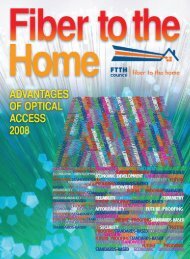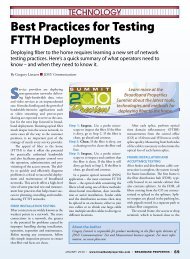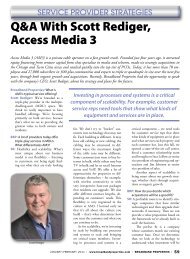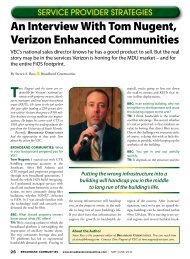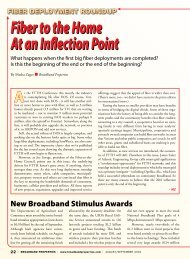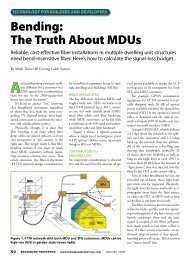2010 Buyers Guide - Broadband Properties
2010 Buyers Guide - Broadband Properties
2010 Buyers Guide - Broadband Properties
Create successful ePaper yourself
Turn your PDF publications into a flip-book with our unique Google optimized e-Paper software.
<strong>Broadband</strong> Is Good…<br />
But International Mileage<br />
May Vary<br />
The Federal Communications Commission (FCC) is looking for a bright<br />
economic line to justify broadband investments. The line is there, but<br />
guidance on the details is lacking.<br />
By Steven S. Ross ■ <strong>Broadband</strong> <strong>Properties</strong><br />
Many nations in widely varying<br />
situations have decided<br />
that broadband is good for the<br />
economy, but predicting the precise benefits<br />
of advanced broadband services is<br />
difficult, said conferees at the Columbia<br />
Institute for Tele-Information (CITI)<br />
Annual State of Telecom Conference in<br />
October.<br />
• Although studies confirm broadband’s<br />
value, the relationship between<br />
enhanced bandwidth and enhanced<br />
benefits is hazy. Raul Katz,<br />
director of business strategy research<br />
at CITI, said, “We do know there is<br />
an [economic] effect that is positive.<br />
We don’t know if there are diminishing<br />
returns for large amounts of<br />
broadband. Economic models tend<br />
to give you an early bump that then<br />
tails off. … We know that when we<br />
move from dial-up to DSL, etc., we<br />
get a bump.”<br />
• Simply passing a household with<br />
available bandwidth does not guarantee<br />
its adoption by individuals and<br />
families.<br />
• Different countries’ approaches to<br />
network regulation and subsidies are<br />
complex and often imperfectly understood<br />
beyond their borders.<br />
• Even when policies are well understood,<br />
other countries cannot replicate<br />
them. Jonathan Liebenau of the<br />
London School of Economics said,<br />
High-powered opening panel. Left to right: Scott Wallsten, FCC; Matthias Kurth, German Federal<br />
Network Agency; Derek Wyatt, Member of Parliament, U.K.; Bernard Benhamou, French Ministerial<br />
Delegate on Internet Usage; Andrew J. Haire, Singapore IDA; Patrik Sandgren, Sweden’s Post and<br />
Telecom Agency; Cezar Alvarez, Brazil’s Head of Cabinet.<br />
“We tried to replicate the U.S. findings<br />
in the U.K. It doesn’t work and<br />
it was naive to think it would work.<br />
Important details differ on [economic]<br />
multipliers. Also, the traderelated<br />
leakage [funds that end up in<br />
other countries to buy equipment,<br />
for instance] is quite different. Thus<br />
the U.K. gets less effect than does the<br />
U.S. Good productivity can replace<br />
work and create unemployment [for<br />
example, in the tourism industry and<br />
in IT]. The positive effect is greatest<br />
in operating but less-than-mature<br />
networks.”<br />
• Residential broadband does not<br />
increase productivity very much,<br />
Leonard Waverman, dean of the<br />
About the Author<br />
Steve Ross is corporate editor of BBP LLC. You can reach him at steve@broad<br />
bandproperties.com.<br />
54 | BROADBAND PROPERTIES | www.broadbandproperties.com | November/December 2009



